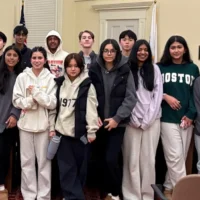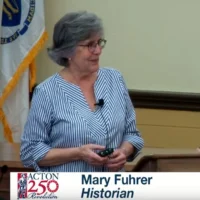On November 13, Acton’s 250 Committee welcomed Dr. Mary Fuhrer as the second speaker in events organized around Acton’s participation in the American Revolution. Dr. Fuhrer, a noted historian who focuses her studies on Colonial New England, is an Acton resident and holds a B.A. from Princeton, an M.A from George Mason University, and a Ph.D. from the University of New Hampshire.
To begin, Dr. Fuhrer invited the over 150 audience members, both in Town Hall and via Zoom, to consider Colonial Acton’s daily life. She pointed out that Acton of the 1770’s was a place most current Actonians would not recognize.
Dr. Fuhrer described five main areas of life: Family and Household, House and Possessions, Farm, Church, and Town
For Family and Household, Dr. Fuhrer described Colonial Actonians as having “deep roots and broad boundaries”. The smalltown families had multiple bonds of marriage or family between them. Families included an average of eight living children, in a patriarchal system. No one in the community lived alone; for example, widows and orphans were taken into other existing households. Additionally, apprentices, hired help, enslaved people, and boarders were added to the “family” unit.
Houses and Possessions were quite different from today. Average homes were built with just two rooms flanking a hall. The parlor, the most prestigious room, not only was the area where guests were received, but was where the master and mistress of the home slept. The bed’s deep feather mattress could be one of the items the owners were most proud of. The hall, where items of daily use were stored, was both a work and gathering space.
Later, with kitchens placed at the rear, and more rooms added above, houses grew to the typical “saltbox” style. Home was primarily the domain of women, who worked the vegetable garden, fed and clothed the family, and processed the harvest from the farm.
Dr. Fuhrer produced a list of every possession in Captain Isaac Davis’ home after his death. Each item was cataloged and valued to determine the estate’s worth for matters of inheritance.
The Farm was the core of family life. While some residents had other jobs, everyone in town farmed. Farms provided sustenance, security, civic identity, and independence for the family, and the entire town.
To sustain the average family, a minimum of sixty acres was necessary. Acreage was set aside as woodlots, for heating and cooking fuel; tillage for growing crops such as grains or flax; and pastureland and orchards to provide apples for hard cider, something deemed safer to drink than water! The remaining land housed the home, barn, and vegetable garden.
Neighborhood took on significant meaning. Neighbors were the glue holding the town together; when help was needed, neighbors assisted. The greatest accolade that could be bestowed on a townsperson was, “He/she was a good neighbor”. The idea of “commonwealth” was prevalent; neighbors helped each other to ensure success for all.
In Colonial times, Church was of major importance. The Puritan Church in New England was a “Covenant Church”, Dr. Fuhrer explained. The Church was considered a “body” and all members were responsible for the well-being, and behavior, of each other, furthering both oversight and bonds between residents.
Lastly, Dr. Fuhrer introduced the idea of Town. Residents “belonged” to the town. Belonging was a specific legal designation. One “belonged” if one was born in or married someone who was born in the town. An outsider could come to “belong” if they resided in town and paid taxes for ten years. If these conditions were not met, one would never “belong”; no rights or assistance would be forthcoming. Town also encompassed daily governing: the establishment of schools, marking the boundaries of town lines, and even Town Meetings, which functioned the way Acton’s Town Meeting still does today.
ABRHS students from Mary Price Maddox’s classes again joined the attendees, as many had done for the first lecture in this series. Afterward, two students spoke with members of the Acton Minutemen to discuss joining the historical re-enactment company.
A video recording of Dr. Fuhrer’s talk is available on ActonTV’s YouTube channel. The next event planned by the Acton 250 Committee will be a walking tour of Acton Center on December 10.


